
Facebook's solar-powered internet drone, Aquila.
Speaking to a room of journalists at the event on Tuesday, Jay Parikh, global head of engineering and infrastructure and Yael Maguire, engineering director and head of Facebook's Connectivity Lab, talked through the huge progress the company's teams have made in its mission to bring the internet to every part of the world. But they admitted there's still a long way to go.
The duo explained how they collaborated with Columbia University and used Facebook's own infrastructure to assess satellite images in 20 countries to estimate that 1.7 billion people live in areas where there is no internet connection. The company is now sharing these new maps and datasets with other companies and academic institutions to use and research, with the hope of speeding up the connectivity of these regions to the internet.
One of Facebook's most ambitious plans to bring the internet to these cut-off areas is through a network of solar-powered internet drones, which autonomously fly above the regions at high altitude for up to three months at a time. The Aquila aircraft, created in the UK, has a wingspan roughly the size of a Boeing 737 but is about a third of the weight of a typical car.
The aim is to create a network of drones that connect to each other using laser communications to spread internet connectivity as far away from base stations on the ground as possible. The team say they have managed to supply "tens of gigabytes per second" between aircraft, which they say is a 10X increase on the other technology currently available in the market.
Maguire explained that the laser connections are actually the relatively easy part from a regulation standpoint - "light is not regulated," so the spectrum is completely open for Facebook to use. That suits Facebook because it is "absolutely not going to be an operator," according to Parikh. Facebook wants to provide the technology and back-end solutions for internet service providers and mobile carriers to operate at a ground level.
And that's where there is some delay. Maguire said on the regulatory side, Facebook needs to overcome hurdles surrounding spectrum and the airworthiness of its drones.
Maguire said Facebook made some progress on the spectrum side last year, when the company was represented by the US government at the World Radio Congress in Geneva where it was granted the ability to study high-frequency millimeter wave spectrums that can be used for platforms like Aquila.
But Facebook is still "three years out" from getting the authorization to actually use the spectrum practically. So even though, as Zuckerberg confirmed on Monday, Facebook will begin test flights of Aquila this year, the commercial deployment of the aircraft will take some time.
The company also needs to convince governments of the merits of its connectivity plans. Earlier this month, for example, India took a pro net-neutrality stance by blocking Facebook's Free Basics program, which allows mobile users to access certain basic internet services (including Facebook) for free. Telecom Regulatory Authority of India (TRAI) announced it had issued the "Prohibition of Discriminatory Tariffs for Data Services Regulations, 2016," which "disallow[s] service providers to offer or charge discriminatory tariffs for data services on the basis of content being access by a consumer."
Parikh echoed Zuckerberg's sentiments in his Mobile World Congress keynote, saying too that the setback was "disappointing" but adding that the company is still having discussions with the Indian government about how to get the scheme off the ground.